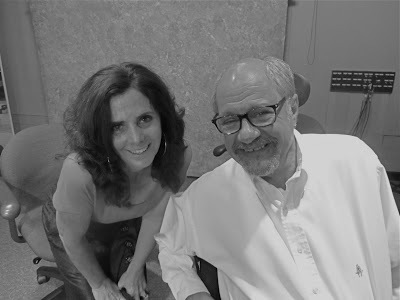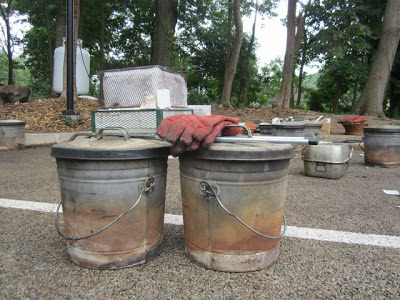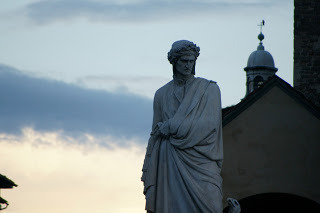Beth Kephart's Blog, page 118
August 13, 2013
Two Truth Podcasts: The Free Library of Philadelphia and Voices in the Family

I'm not going to lie: I was nervous. Nervous (and privileged) to stand before the Philadelphians who had come to help me launch Handling the Truth at the Free Library of Philadelphia on August 6th, and nervous to sit in the company of the very famous Dr. Dan Gottlieb on the WHYY show, "Voices in the Family."
I suspect those nerves were easily detected.
(Are you nervous? Dr. Gottlieb asked me, as the show was about to tape. Yes, I said. Good, he said. I'm always nervous when my guests aren't nervous.)
Still, that evening and afternoon will always remain in my memory as important moments, rare ones. I share the podcasts here.
The Free Library of Philadelphia (thank you, Andy Kahan and Laura Kovacs)
Voices in the Family (thank you, Dan Gottlieb and Jennifer Lynn)
And thanks to all who came and listened.




Published on August 13, 2013 13:38
Katie Hafner, Kate Christensen, Nathaniel Popkin: what I'm reading now

This past week I read Howard Norman's beautiful (and Michael Ondaatje endorsed!) I Hate to Leave this Beautiful Place as well as Rebecca Solnit's fierce and bracing The Faraway Nearby.
Now on my desk sit Katie Hafner's Mother Daughter Me and Kate Christensen's Blue Plate Special, along with my friend Nathaniel Popkin's first novel, Lion and Leopard, due out in October from the new Philadelphia publishing house, The Head and the Hand Press.
So much wrong can happen each day. But a good book close by is transformative.
I'll be sharing word about these books as soon as I can.
In the meantime, those looking for a good memoir to read (beyond the nearly 100 referenced in Handling the Truth) can find a few recommendations here.




Published on August 13, 2013 05:29
August 11, 2013
Sharing an hour with Dr. Dan Gottlieb, on Voices in the Family

You know those conversations that you wish would go on forever?
I had one of those a few weeks back with Dr. Dan Gottlieb, the beloved creator of the WHYY program, Voices in the Family. I was a guest—sharing time with James Pennebaker, talking about memoir, and laughing during the breaks. Dr. Gottlieb has a lullabye voice, a perfectly pressed shirt, and a tolerance for guests who show up with frizzy hair. He also has a wonderful producer named Jennifer Lynn, who pre-interviewed me in a phone conversation that might have also (do I repeat myself?) gone on forever.
I was grateful for the live dialogue. And I'm grateful that the hour-long show will air tomorrow at noon in Philadelphia and surrounds. It will be available to everyone as a podcast by 2 PM.
The details here.




Published on August 11, 2013 17:39
I Hate to Leave this Beautiful Place/Howard Norman: Reflections

Today I went to a garden searching for an image worthy of Howard Norman's new memoir, I Hate to Leave this Beautiful Place.
There was this, above, a suggestion of the many vivid parts that constitute this surprising memoir's whole—Norman's summer as a fifteen-year-old employee of the local bookmobile (not to mention lover-in-training, thanks to his brother's girlfriend, Paris, and amateur outsdoorsman, with terrible unintended consequences, and son of a mostly missing father), Norman as a young man trying to find his way in a cold and bitter Canadian city (to pay off an auction debt, to be worthy of a woman he might have loved, to keep company with an older, regretful man), Norman among the Intuits (their folklore, their landscapes, their whale-spume horizons, their birds), Norman in Vermont (it was the summer of Ken Burns' Civil War documentary; it was the summer of wells and hallucinations and fevers), and Norman as the man who tries to reclaim the home that he lent to a poetess and her young son—the home in which she committed a ghastly and famous murder-suicide.
So the parts. The vivid parts of Beautiful Place.

But also the alighted nature of the memoir's structure, the intricate workings among and between things. The time shifts, the slight but never precious self-effacements, the humor within the melancholy within the humor, and his overt address to each. The way art—Norman's art—comes into this, but only slightly and only sometimes. Beautiful Place is not a "how I became a writer" memoir—not in the least. It's a book of true, landscape-framed stories—five chapters circling five discoveries in five eras of Norman's life. Norman twice recalls the Robert Frost line about the best way out being through. He shows himself circling, regretting, freezing, succumbing, lying, and being a better man. He shows himself in the company of birds, and in the company of dying things, and in the light of the moon by the shore.
It's gorgeous writing, every sentence calm and clear and (again) vivid: "The novels I was reading at the time deftly orchestrated implausibilities along a clear narrative line, but I could not locate such a line in my own life." "As he dusted each globe with a moistened cloth and inspected it for hairline cracks, Michael also turned it upside down and them right side up so that the fabricated snowflakes inside fell like confetti on interior tableau." "In 1990, the second full summer in our 1850s farmhouse in Vermont, everything I loved most happened most every day, with exceptions."
I read many books that I love and many I want to share, and then there are those books that I read and think: This is a book that I must teach.
I will teach Howard Norman to my students at Penn next spring.




Published on August 11, 2013 16:11
August 10, 2013
The Faraway Nearby/Rebecca Solnit (Reflections)/and thank you, Katrina Kenison

Several years ago, my father, a talented gardener, asked me what I wanted most, and I said hummingbirds. A few weeks later, there he was—digging a hole near my front door and planting a trumpet vine.
It's become a monstrosity, since—making the overtaken house look like something straight out of a Grimm's fairy tale. My husband threatens to do away with the vine. I trim it back, faithfully. I say, "But the hummingbirds will come." And this summer they've come in force.
Earlier today I was sitting outside, reading Rebecca Solnit's The Faraway Nearby, when one particularly curious hummer came near and stayed long enough for me to take its portrait. It was as if Solnit herself had engineered the scene, or given it to me. I own every single Solnit book. I take great pleasure in them. And I'm pretty sure that she'd find a story here—in the monstrous vine and the sweet visitation, the madly fluttering wings and the stopped heart of the reader who looked up in time.
The Faraway Nearby is Solnit at her most fierce and, often, her most fine. This is memoir intellectualized. It's Solnit reflecting on the gift of apricots—countless apricots—that came her way just as she was entering her final chapters as a daughter. Held within this frame are other stories—of the man who left Solnit at a terrible time, of Solnit's own experience with illness, of a trip taken to Iceland, of a river ride. In-depth investigations of fairy tales and Frankenstein, hot and cold, forgiveness and understanding, surviving and dying bind. You cannot anticipate Solnit's mind. You cannot think, even if you feel as if you are on solid, shared ground (the story of Frankenstein, for example, or the biography of Virginia Woolf) that you know where she is headed. But you can trust that, no matter how far away from her seeming purpose Solnit goes, she will remember where she started from, and she will loop back in, put in another stitch or two, even as she warns against pretty seaming.
Solnit's evaluation of her mother often bristles. Her characterization of Alzheimer's alarms. The old boyfriend doesn't get away with much. But there's so much, so much, to Solnit's intellect, her search to understand, her desire to get things right, her ability to transcend herself, and she's brilliant with those apricots—bracing and authentic.
This abundance of unstable apricots seemed to be not only a task set for me, but my birthright, my fairy-tale inheritance from my mother who had given me almost nothing since my childhood. It was a last harvest, a heap of fruit from a family tree, like the enigmatic gifts of fairy tales: a magic seed, a key to an unknown door, a summoning incantation. Bottling, canning, composting, freezing, eating, and distilling them was the least of the tasks they posed. The apricots were a riddle I had to decipher, a tale whose meaning I had to make over the course of the next twelve months as almost everything went wrong.
I am glad to have read this book. Glad that I fought for the time.
And I am glad, too—grateful—for Katrina Kenison, who was one of the very first readers of Handling the Truth, who was the very first person who put words to it, and who has shared my quest, throughout the years, to write and understand memoir. Katrina has more friends in the e-universe than I can summon a quantifier for. And today she blesses me by sharing Handling with her readers on a blog that—newly updated—has something for everyone. She's even offering a give-away.
That's all happening here. Please take a look.




Published on August 10, 2013 12:52
August 9, 2013
it's time to go clean

When the work is crushing and the heart is pounding and there are those creeping, incriminating thoughts at night (but she promised to...., but he said he would...., but why was that bright lie told?...., but why would he do that?..., did she really just?)—that's when I know that it's time to go clean. To push back, stand up, haul away, Windex through, get the bleach into the sink, scrub the bath tub, yank the weeds.
A clean house begets a clear heart begets a rinsing away of the interfering but's. It sets me free to do the work that must be done.
I am about to return to the land of Florence. Thank you, Tamra Tuller, for your careful, loving read.




Published on August 09, 2013 14:09
August 8, 2013
and now for a little Raku



I can now (and through the end of time) be nothing short of honest (the perils of publishing a book with the word 'truth' in the title):
I have lost what little pottery mojo I once had.
This six-week session was focused on raku. Work pulled me away for three of those six sessions, leaving me time handicapped. The others in the class weren't just far more focused; they were all pros—teachers, long-time artists, thoughtful souls with 3D skills, women (and one man) who are not afraid of fires.
Then there was me: Nobody. Nameless. (This happens when I'm with my husband, whether we are dancing or potterying, I am a shadow.)
Today the work of the class was kilned for the first time. I couldn't stay for the duration, for I had a talk to give—hair that could not be filled with bacon-smelling smoke (thank you, Karen, for the detail), fingers that could not be burned, a psyche that could not (again) be damaged. I stayed just long enough to see the pieces go in to the heat of the kiln, and then be pulled back out to the reduction buckets.
Some views above. My two pieces, here. "Truth," the one says. I'm telling you.
Pottery Ladies and Honorary Pottery Lady: I remain in your debt. And someday I want to raku like you.




Published on August 08, 2013 14:47
sweet words on Truth from Hudson Valley News

"This book made me want to go out and read every memoir the author recommends. Part memoir and part memoirist's manifesto, this book will teach you how to tell your story. And remember, it's never the thing that happened that matters most. It's what's been learned, and how the learning has been shaped. This is a booklover's delight, whether or not you want to be an author as well as a reader."
Ann La Farge, Hudson Valley News




Published on August 08, 2013 12:09
we've already won

On the other side of noon, yesterday. The phone rings. I hear it bleating, can't remember where I put it, run from my toppled-over-with-work desk, find it just in time. Hello? It's my son on the other end, his voice like the gloaming, full of notes. "Hey," he says, and it begins. News about work (still more client projects migrating his way). News about his new city (it's gorgeous there, a newly found neighborhood recalling streets of Europe). News about friends (old, new, he might get that job after all, she remembered his name). I could hear the traffic of the street beside him. Vendors and bus rumbles. I could hear his words most of all, "I have everything I want in life."
Lately, as part of my job, I've been talking to people who have had pressed upon them extraordinarily difficult circumstances. Nothing about what they are facing is their fault. Much about the way they are living epitomizes grace—despite it all. Harrowing lives heroically lived. I stumble, I keep up, I listen, I write it down. I hang up, dazed and determined.
My son is living on an ad-man's starting salary in one of the world's most expensive cities, and he has all he wants. Those with whom I speak face the steepest hurdles, and yet there is light in them, plenty.
We go out, every day, in search of the big stuff. And yet, as my brother-in-law likes to say, we've already won.




Published on August 08, 2013 02:54
August 7, 2013
An Extraordinary Theory of Objects/Stephanie LaCava: Reflections

I was at Main Point Books with my friend Kelly when I spotted something unusual on the memoir shelf.
I tend to appreciate unusual. I tend to buy it.
An Extraordinary Theory of Objects: A Memoir of an Outsider in Paris was created by the fashion writer Stephanie LaCava and the illustrator Matthew Nelson; writer and illustrator are inseparable here. So are writer, illustrator, and footnotes, the latter being a device LaCava relies on throughout a book in which objects serve as the dot-to-dot dots between an eccentic (purposely so) narrative thread. Objects such as poison arrow tree frogs, a skeleton key, an Egyptian sarcophagus-shaped metal pencil case, and a curved whale's tooth, for starters. Objects the young LaCava collected during alien days in Paris, where her family moved and left her feeling stranded—and inclined toward late-night scavenger walks alone. LaCava needed to assert some control over her world. Objects helped.
Early on, LaCava explains:
I never imagined I would live as I do today; I don't think I even believed I'd make it past twenty. Romantic love and calm were the great, elusive intangibles. I can now sit still for the length of a film, though my mind wanders. Love has come in unlikely forms and continues to surprise me. And the objects are still there, but only as mementos of more profound observations.
Theory is a meandering book that turns around bright, hard moments. It floats, then it gets straight to the point. The footnotes alone are worth the price of omission—odd, thorough researched, and unexpected as they delve into the secret histories of coral, slip dresses, the lily of the valley, kaleidoscopes, a child's sailboat, and more. LaCava, who describes herself as an awkward, frail, nearly friendless teen (so difficult to imagine when you look at photos of this beautiful woman today) catalogs these objects, takes her strength from them, also hides behind them. She becomes a woman who writes, again early, "Here is my story, but told in a strange way. Consider the source."
I like risk takers. I don't always seek continuity from memoir, am grateful to be given a few hours with a book that teaches and redirects about the world at large. I recommend this fit-in-your-hand book to anyone searching for something different. And I recommend LaCava's blog, what she calls her "phantom cabinet of curiosities," which you can peruse here.




Published on August 07, 2013 11:56



